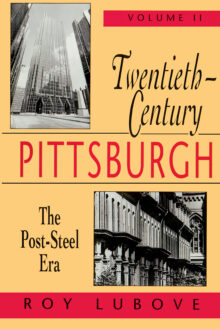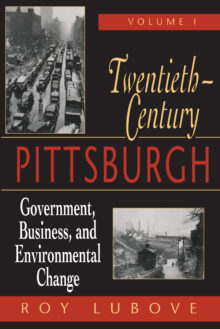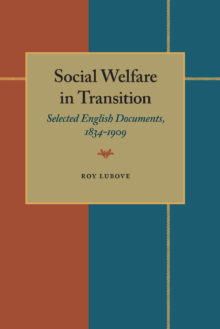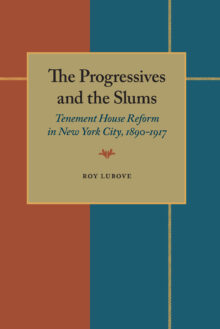

Roy Lubove
Roy Lubove, was professor of social welfare and history at the University of Pittsburgh and the author of several books, including: The Progressives and the Slums; Social Welfare in Transition: Selected English Documents, 1834Ð1909and Community Planning in the 1920s: The Contribution of the Regional Planning Association of America.
Twentieth-Century Pittsburgh, Volume Two
The Post-Steel Era
This volume traces the major decisions, events, programs, and personalities that transformed the city of Pittsburgh during its urban renewal project, which began in 1977. Roy Lubove demonstrates how the city showed united determination to attract high technology companies in an attempt to reverse the economic fallout from the decline of the local steel industry. Lubove also separates the successes from the failures, the good intentions from the actual results.
Twentieth-Century Pittsburgh, Volume One
Government, Business, and Environmental Change
Roy Lubove's Twentieth-Century Pittsburgh is a pioneering analysis of elite driven, post-World War II urban renewal in a city once disdained as “hell with the lid off.” The book continues to be invaluable to anyone interested in the fate of America's beleaguered metropolitan and industrial centers.
Social Welfare in Transition
Selected English Documents, 1834-1909
Roy Lubove provides an analysis of three landmark documents in British social history: Edwin C. Chadwick's 1842 report he Sanitary Condition of the Labouring Population of England; the 1834 Report of the Royal Poor Law Commission; and the majority and minority Reports of the Royal Poor Law Commission of 1909. Chadwick's work was instrumental to developing modern public health and sanitary controls. The 1834 report shaped attitudes toward poverty and poor law institutions for nearly a century. The 1909 reports suggested major revisions to the 1834 document, particularly in transferring responsibility to local government, away from private institutions. Taken together, the three documents illustrate changing perceptions of poverty, the organization of welfare institutions, and the role of the state.
The Progressives and the Slums
Tenement House Reform in New York City, 1890-1917
The Progressives and the Slums chronicles the reform of tenement housing, where some of the worst living conditions in the world existed. Roy Lubove focuses his study on New York City, detailing the methods, accomplishments, and limitations of housing reform at the turn of the twentieth century. The book is based in part on personal interviews with, and the unpublished writings of Lawrence Veiller, the dominant figure in housing reform between 1898 and 1920. Lubove views Veiller's role, surveys developments prior to 1890, and views housing reform within the broader context of progressive-era protest and reform.




